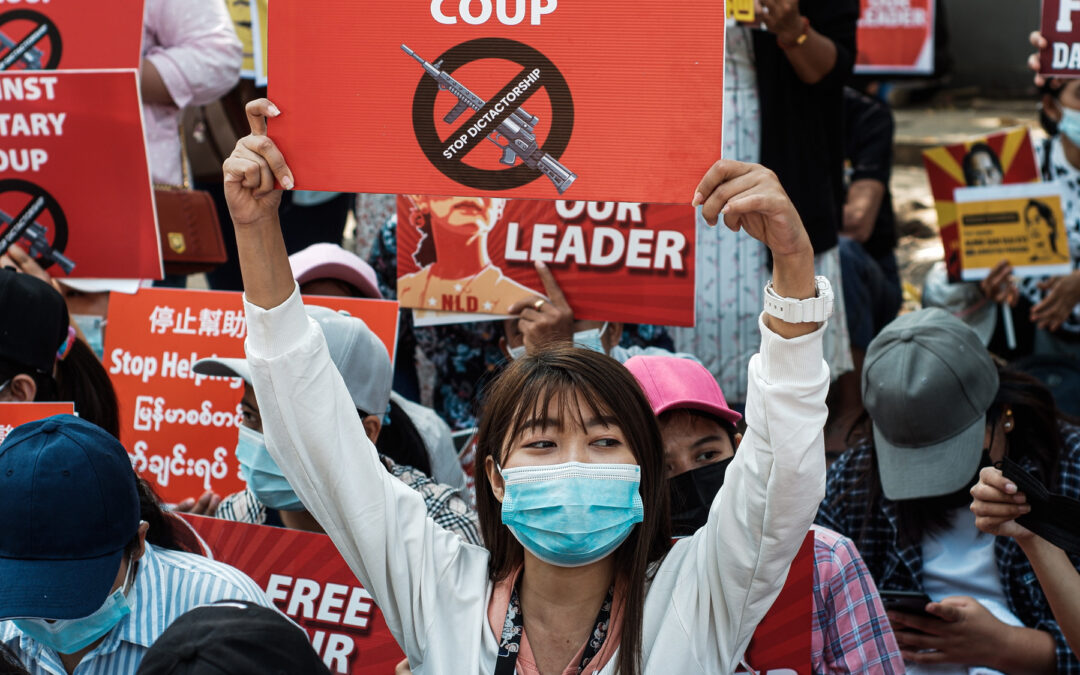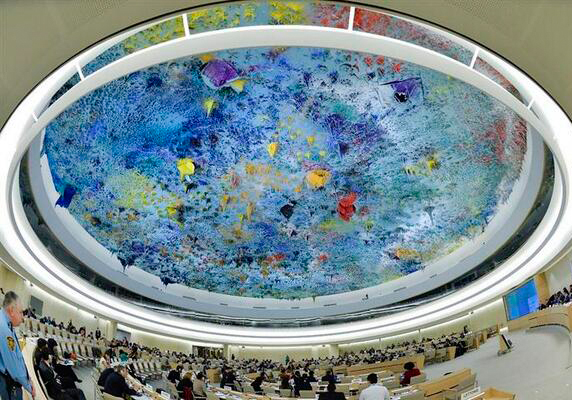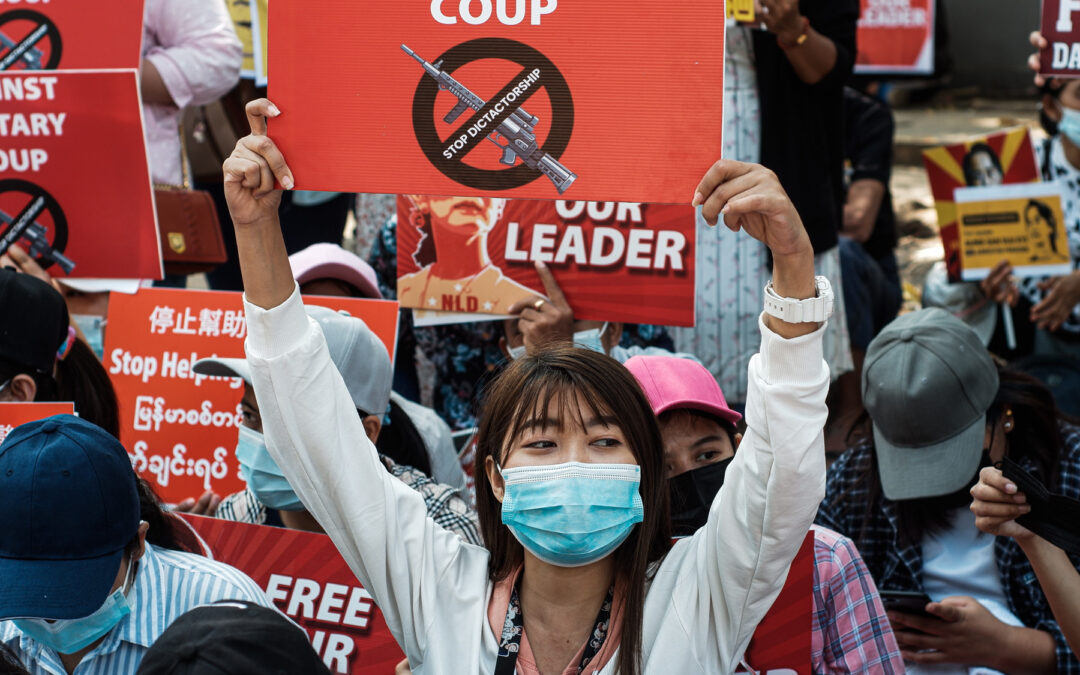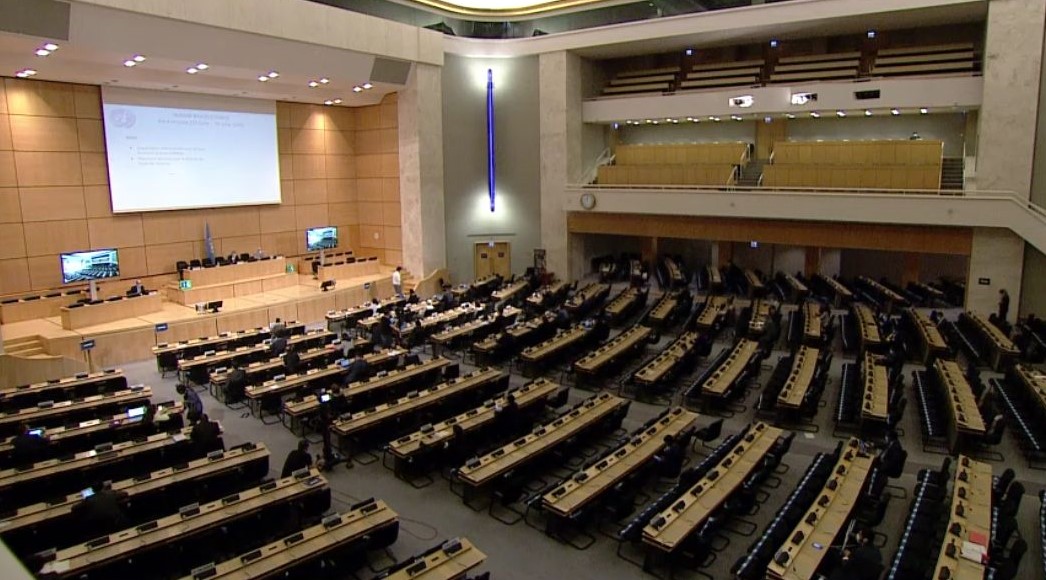
Mar 15, 2021 | Advocacy, Non-legal submissions
Today, during a General Debate, the ICJ called on the UN Human Rights Council to condemns a set of laws amendend by the military governmentn in Myanmar and restricting human rights, and to demand the return to of Myanmar civilian rule respecting the rule of law.
The statement reads as follows:
“Madame President,
The International Commission of Jurists (ICJ) condemns the illegitimate attempts to “amend” several laws by the Military appointed Myanmar’s State Administration Council (SAC) following its unlawful seizure of power on 1 February 2021.
The implementation of the Amended Law Protecting the Privacy and Security of Citizens (2017) would undermine the democratic process, criminalize peaceful protests and remove various human rights protections. It would provide for broad and unchecked power to the military to arrest anyone without a warrant and aim to remove basic protections, including the rights to be free from arbitrary detention and from warrantless surveillance and search and seizure.
The amendments to the Penal Code and the Criminal Procedural Code have made non-bailable certain offenses, specifically targeting persons criticizing the coup or the military junta, as well as those encouraging others to support the “Civil Disobedience Movement.”
In addition, Amendments made to other existing laws, such as the Ward and Tract Administration Law and Electronic Transactions Law, allow for search and seizure at night without arrest warrant and allow for the silencing of critical voices against the coup and human rights violations of the military, in violation of international standards.
The ICJ calls on the Council to adopt a resolution, which, among other things, univocally condemns and demands the repeal of these laws and the return to of Myanmar civilian rule respecting the rule of law.
Thank you.”

Mar 12, 2021 | Advocacy, Non-legal submissions
Today, the ICJ delivered a statement to the UN Human Rights Council calling for accountability for crimes against humanity committed in Myanmar during the Interactive Dialogue on the report by the UN Special Rapporteur on the situation of human rights in Myanmar.
The statement reads as follows:
“Madame President,
The International Commission of Jurists (ICJ) welcomes the recent report of the Special Rapporteur on the situation of human rights in Myanmar.
The widespread gross violations of human rights documented in the report – including extrajudicial killings, arbitrary arrests and detention- underscore the need for urgent measures of accountability to redress these and to deter further violations.
ICJ has documented further evidence that the unlawful crackdown against peaceful protestors have continued to worsen leading to more extrajudicial killings. More than 50 people have already been unlawfully killed and several hundreds have been severely injured.
Hundreds of others have been arbitrarily arrested and detained, with some subjected to torture and ill-treatment. As the scale of violations continues to increase in many parts of the country, these attacks have become systematic and widespread, and must be investigated as crimes against humanity.
The ICJ therefore supports the recommendations made by the Special Rapporteur, including for referral of the situation to the ICC.
The ICJ urges the Council to adopt a resolution that would strengthen and support the IIMM’s work to collect and preserve evidence for accountability; and to extend the mandate of the Special Rapporteur, including to ensure the immediate, full and unrestricted monitoring of the situations and prompt and effective implementation of their recommendations.
Thank you.”
Contact:
Massimo Frigo, ICJ UN Representative, e: massimo.frigo(a)icj.org, t: +41797499949

Mar 4, 2021 | News
The escalating killing of peaceful protestors by Myanmar’s security forces should be independently investigated as possible crimes against humanity, said the ICJ today on the eve of a closed-door UN Security Council session on the situation.
According to reliable information provided to the ICJ, security forces have unlawfully killed approximately 50 unarmed people – including at least five children – in more than 10 cities on different days since the military overthrew the civilian government on 1 February 2021. On 3 March, at least 38 people were reported killed by security forces.
In addition, numerous protestors have been injured and a total of 1,498 people have been arrested, charged or sentenced in relation to the military coup, according to The Assistance Association for Political Prisoners (AAPP).
“As the scale of the violence continues to increase, seemingly as part of a systematic, centralized policy to use lethal force against peaceful protestors, it is hard to escape the conclusion that Myanmar’s security forces are perpetrating crimes against humanity,” said Kingsley Abbott, Director of Global Accountability and International Justice at the ICJ. “This underscores the urgent need for all states, including the permanent members of the UN Security Council, to stop shielding the Myanmar military and work together towards opening avenues to justice for the Myanmar people.”
The UN Security Council will meet this Friday for a closed-door session at the request of the United States which is President of the Council in March 2021.
“The UN Security Council should immediately refer Myanmar to the International Criminal Court for a full independent and effective investigation,” added Abbott.
In addition to acts that may constitute murder as a crime against humanity, security forces have also reportedly committed acts which, when committed in a widespread and systematic manner, would amount to other crimes against humanity, including imprisonment, torture, and enforced disappearance – all of which also go towards supporting the existence of an attack.
“These killings and other crimes under international law are a direct result of the culture of impunity that has been allowed to persist in Myanmar for decades,” added Abbott. “All states should support the different accountability initiatives underway, including the Independent Investigative Mechanism for Myanmar which is collecting evidence for use in future legal proceedings.”
“It is long past time for perpetrators of serious human rights violations in the country to be brought to justice before the International Criminal Court or in any national jurisdictions willing and able to exercise universal jurisdiction.”
Background
On 12 September 2018, following an independent investigation, the United Nations Independent International Fact-Finding Mission on Myanmar called for Myanmar’s military to be “…investigated and prosecuted in an international criminal tribunal for genocide, crimes against humanity and war crimes” concerning alleged violations in Shan, Kachin and Rakhine States and elsewhere throughout the country.
Under general international law, including customary international law and treaties and statutes of international criminal courts, crimes against humanity must be prosecuted. The authoritative definition of crimes against humanity is contained in the Rome Statute of the International Criminal Court (ICC).
Under Article 7 of the Rome Statute, for killings to amount to crimes against humanity, they must be committed as part of a widespread or systematic attack directed against any civilian population, with knowledge of the attack. According to the elements of crimes of the Rome Statute, “’Attack directed against a civilian population’ in these context elements is understood to mean a course of conduct involving the multiple commission of acts referred to in Article 7, paragraph 1, of the Statute against any civilian population, pursuant to or in furtherance of a State or organizational policy to commit such attack. The acts need not constitute a military attack. It is understood that ‘policy to commit such attack’ requires that the State or organization actively promote or encourage such an attack against a civilian population.”
Generally speaking, “widespread” refers to the geographical scope of the attack and the number of victims, but not exclusively. “Systematic” refers to the organized nature of the acts of violence and the improbability of their random occurrence.
Myanmar is not a State Party to the Rome Statute of the ICC. However, the ICC is investigating crimes committed against the Rohingya minority as part of waves of violence in Rakhine State in 2016 and 2017 where one element or part of the crime was committed inside Bangladesh, which is a party to the Rome Statute. The ICC would be able to conduct a full investigation of the situation in Myanmar if the UN Security Council used its Chapter VII powers to refer the matter to the ICC pursuant to Article 13(b) of the Rome Statute.
Universal jurisdiction refers to the legal concept that States have the authority, and in some cases the obligation, to bring proceedings in relation to certain crimes, including crimes against humanity, because they are so serious it does not matter where the crimes were committed or the nationality of the perpetrators or the victims. States are generally entitled to exercise jurisdiction for serious under crimes under international law.
Contact
Kingsley Abbott, ICJ Director of Global Accountability and International Justice; e: kingsley.abbott(a)icj.org
Sam Zarifi, ICJ’s Secretary General, sam.zarifi(a)icj.org

Mar 2, 2021 | News
Myanmar’s military government should reverse its post-coup d’etat revisions of legal protections for human rights in the country, the ICJ and Human Rights Watch said today.
Myanmar’s State Administration Council (SAC), appointed by the country’s military after it overthrew the elected civilian government on February 1, 2021, has dictated key revisions to the country’s legal system that criminalize even peaceful protests, and enable violations of the right to privacy and arbitrary arrests and detention. The changes were made through orders signed by the commander-in-chief, Sr. Gen. Min Aung Hlaing, on behalf of the SAC, and outside the parliamentary process.
“As Myanmar’s military increasingly relies on excessive force and intimidation to quell peaceful protests against its coup, it is trying to give a veneer of legality to its actions by subverting existing protections in the legal system.”
“These revisions, which violate the principle of legality and Myanmar’s international obligations, in no way excuse or legitimate the widespread violations of human rights now taking place in Myanmar.”
– Ian Seiderman, ICJ’s Director of Law and Policy.
Since the coup on February 1, the military junta has:
- arbitrarily suspended sections of the Law Protecting the Privacy and Security of Citizens (2017), removing basic protections, including the right to be free from arbitrary detention and the right to be free of warrantless surveillance and search and seizure;
- amended the Penal Code to create new offenses and expand existing offenses to target those speaking critically of the coup and the military, and those encouraging others to support the “Civil Disobedience Movement”;
- amended the Ward and Tract Administration Law to reinstate the requirement to report overnight guests;
- amended the Code of Criminal Procedure to make the new and revised offenses non-bailable and subject to warrantless arrest; and
- amended the Electronic Transactions Law to prevent the free flow of information and criminalize the dissemination of information through cyberspace, including expression critical of the coup or the acts of the junta.
Under international legal standards, any restrictions on human rights must be strictly necessary to protect a legitimate interest and proportionate to the interest being protected, even in times of public emergency or for legitimate national security purposes (conditions that do not apply in Myanmar currently). The orders issued by the SAC fail to meet that standard, as they will arbitrarily interfere with the exercise of rights protected under international law, including freedom of expression, freedom of peaceful assembly, the right to liberty, and the right to privacy. Certain rights, such as the rights to bodily integrity and nondiscrimination, are not subject to restriction.
“By stripping the people of Myanmar of their basic rights, the military is once again demonstrating its disdain for international human rights protections,” said Linda Lakhdhir, Asia legal advisor at Human Rights Watch. “The junta cannot justify the oppression of Myanmar’s inhabitants through the unilateral creation of arbitrary new laws.”
Contact
Osama Motiwala, ICJ Asia-Pacific Communications Officer, e: osama.motiwala(a)icj.org
Mandira Sharma: ICJ Senior Legal Adviser, e: mandira.sharma(a)icj.org
Analysis of Legal Code Changes
Law Protecting the Privacy and Security of Citizens (2017)
On February 13, the State Administration Council arbitrarily suspended sections 5, 7 and 8 of the Law Protecting the Privacy and Security of Citizens, eroding basic protections for individuals.
Section 5 required the presence of two witnesses whenever the police enter a residence for the purposes of search or seizure “to ensure that there is no damage to the privacy or security of the citizen.” The suspension of that protection significantly raises the risk of abuses during searches and arrests.
Section 7 required a court order for any detention of more than 24 hours. Suspension of the provision will facilitate violations of international law, which provides that any person detained on a criminal charge be promptly taken before a judge.
Section 8 provided protections of an individual’s right to privacy by prohibiting search and seizure, surveillance, spying, or any investigation affecting the privacy, security, and dignity of the individual without a court order – protections that the junta has removed. Under international law no one shall be subjected to arbitrary interference with their privacy, family, home or correspondence.
Penal Code Amendments
On February 14, the SAC announced amendments to the Penal Code that could lead to criminal liability for thousands of demonstrators exercising their rights to free expression of their views, and anyone publicly criticizing the military coup d’etat through any means.
The SAC inserted a new provision, section 505A, that could be used to punish comments regarding the illegitimacy of the coup or the military government, among others. The new section would criminalize comments that “cause fear,” spread “false news, [or] agitates directly or indirectly a criminal offense against a Government employee.” Violation of the section is punishable by up to three years in prison.
Section 505(a) previously made it a crime to publish or circulate any “statement, rumor or report” “with intent to cause, or which is likely to cause, any officer, soldier, sailor or airman, in the Army, Navy or Air Force to mutiny or otherwise disregard or fail in his duty.” It has been replaced with much broader language clearly designed to penalize those encouraging members of the civil service of the security services to join the Civil Disobedience Movement.
Under the revised provision, any attempt to “hinder, disturb, damage the motivation, discipline, health and conduct” of the military personnel and government employees and cause their hatred, disobedience or disloyalty toward the military and the government is punishable by up to three years in prison.
The SAC also significantly broadened the “treason” provisions in section 124 of the Penal Code. Section124A, which already criminalized comment that “bring into hatred or contempt” or “excite disaffection against” the government, was expanded to include comments relating to the defense services and defense services personnel, effectively criminalizing any criticism of the military or military personnel. Violation of the section is punishable by up to 20 years in prison.
The newly added section 124C imposes a prison term of up to 20 years on anyone who intends to “sabotage or hinder the performance of the Defense Services and law enforcement organizations who are engaged in preserving the stability of the state.” This provision would criminalize efforts to encourage security forces to join the Civil Disobedience Movement or permit unauthorized protests.
Finally, under section 124D, a person can be sentenced up to seven years in prison if they hinder a government employee from carrying out their duties. This provision is so broad that any actions of protesters could be interpreted as preventing security personnel or defense service officers from performing their duty.
Code of Criminal Procedure
On February 14 the junta amended the Code of Criminal Procedure Amendment Law to make offenses under sections 505A, 124C and 124D non-bailable and subject to arrest without a warrant.
Ward or Village Tract Administration Law (13/2/21)
The amendments to the Ward or Village Tract Administration Law (13/2/21) further increase the military’s ability to conduct surveillance on people’s movements, in particular on human rights defenders seeking shelter away from their own homes. Amendments to section 17 of the Act require all overnight guests from other wards or villages to be reported to the ward or village tract administrator, who are authorized by section 13 to “take action” against any who “failed to inform the guest list.” Section 27 reintroduces criminal sanctions for failing to report overnight guests. Such provisions existed under previous military governments and were deeply resented.
Electronic Transactions Law (Law No 7/ 2021)
On February 15, the junta also amended the Electronic Transactions Law to include, among others, provisions that had been proposed in the draft Cybersecurity Law.
As was true under that much-criticized draft law, the amended Electronics Transactions Law permits government agencies, investigators, or law enforcement to access personal data in relation to “cyber-crimes,” “cyber misuse” or any criminal investigation.
The amendments also include several provisions (articles 38(d) and (e)) that provide criminal penalties for “unauthorized” access to online material and that could be used to prosecute whistle blowers, investigative journalists, or activists who use leaked material for their work.
Section 38B criminalizes “obtaining, disclosing, using, destroying, modifying, disseminating, or sending someone’s personal data to anyone else without approval,” with one to three years in prison. While the protection of the right to privacy online is important, this provision goes well beyond legitimate protections on privacy and imposes arbitrary restrictions on freedom of expression.
In particular, “personal data” is defined in a manner so broad as to include virtually any information associated with a person. The law is therefore impermissibly vague and overbroad, as it would likely prevent even the disclosure of information about anyone involved in alleged human rights violations, including by human rights defenders and journalists.
Section 38C criminalizes the creation of “misinformation or disinformation with the intent of causing public panic, loss of trust or social division on cyberspace,” and provides for imprisonment of one to three years in addition to fines. These provisions are similarly vague and overbroad and unnecessarily and disproportionately limit the exercise of expression online, including criticism of the coup and the military junta.
***
Download the full statement here.

Feb 12, 2021 | Advocacy, Non-legal submissions
The ICJ today addressed an emergency Special Session of the UN Human Rights Council on Myanmar, outlining violations to human rights and the rule of law occurring in the country since the coup d’état of 1 February.
The Special Session is expected to adopt a resolution to address “The human rights implications of the crisis in Myanmar.”
The ICJ statement read as follows:
“Madame President,
The International Commission of Jurists condemns the Myanmar military’s unlawful seizure of authority and the unconstitutional declaration of a state of emergency on 1 February.
These actions defy core rule of law principles and provide an illegitimate basis for the suspension and erosion of human rights.
Nearly 200 people, including human rights defenders, have been arbitrarily detained, some in unknown locations. Security forces have used excessive force against peaceful protesters, causing serious injuries.
Regulations imposed pursuant to the state of emergency grant military forces nearly complete impunity. Furthermore, these regulations suspend crucial judicial remedies for violations of rights, such as the writ of habeas corpus.
Judges, including from the Supreme Court, have been illegally removed and replaced, undermining the independence of an already embattled judiciary.
The military takeover further endangers the already grave situation of the Rohingya community.
The ICJ calls on the Human Rights Council to urge the military to immediately return authority to the civilian government and allow immediate access to the Special Rapporteur on Myanmar and other special procedures, the OHCHR, and the Independent Investigative Mechanism for Myanmar, whose mandate includes investigating all serious human rights violations.
Member States should take necessary measures to ensure truth, justice and accountability for crimes under international law, including by supporting all relevant accountability mechanisms.
Thank you.”









